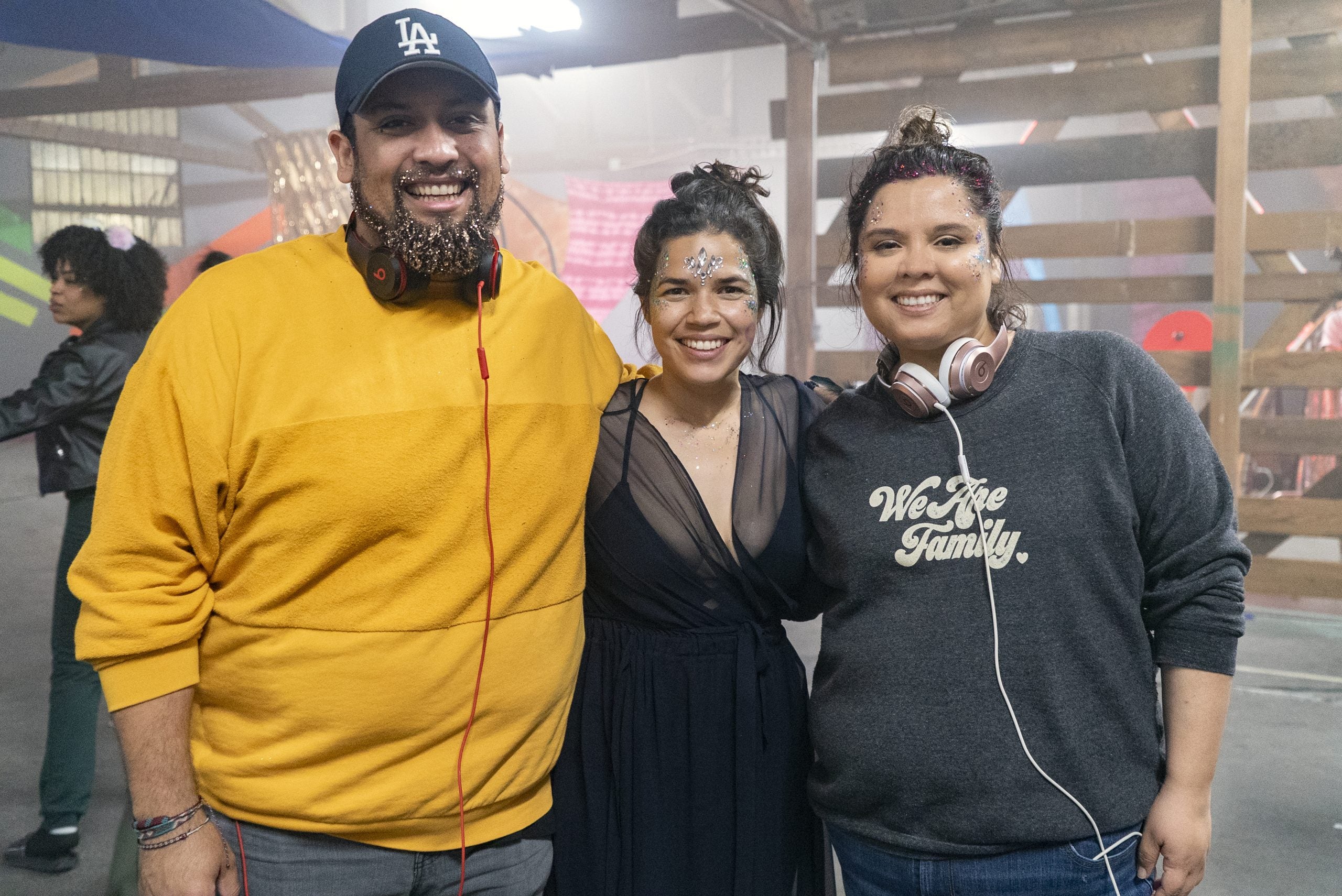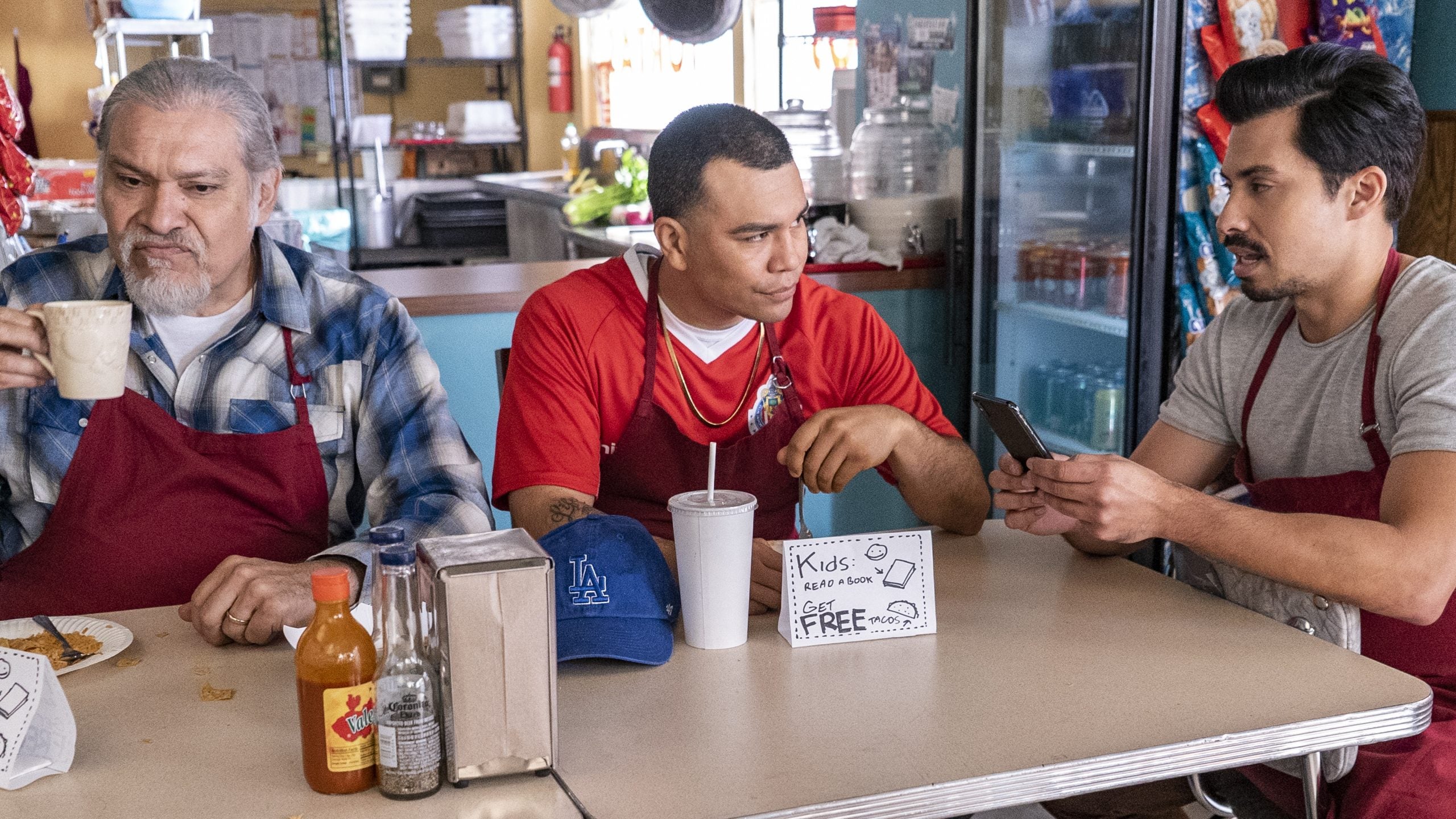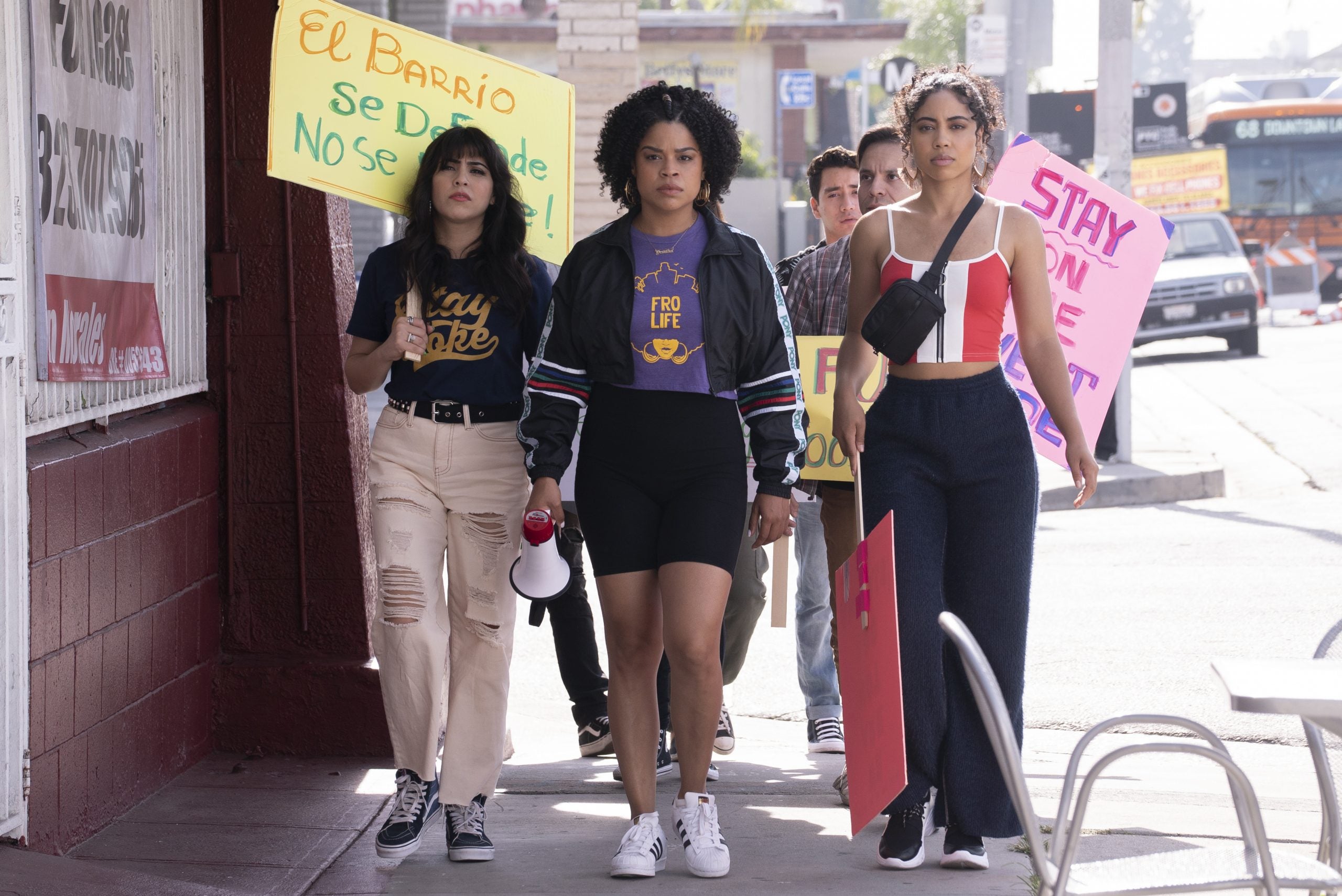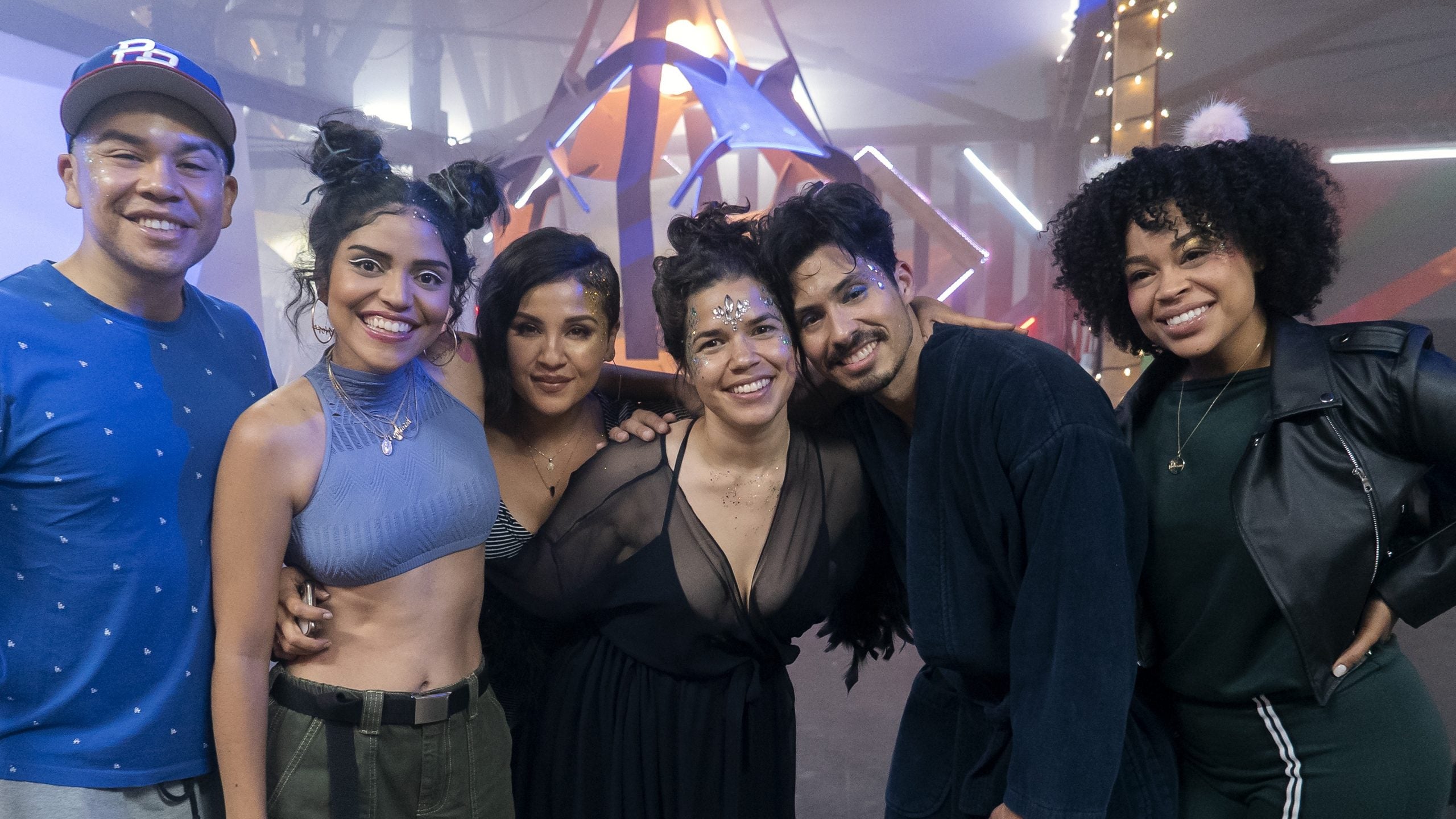Linda Yvette Chávez and Marvin Lemus are the brilliant creators behind the bilingual Netflix comedy-drama series Gentefied, currently streaming. Together, they have been working for five years to tell an authentic story about Mexican-American identity and East Los Angeles. The mostly Latinx cast follows the Morales family, owners of taqueria Mama Fina’s Tacos in the increasingly gentrifying Boyle Heights neighborhood. Led by the immigrant patriarch Casimiro “Pop” Morales (Joaquín Cosio) and his four grandchildren, this charming series finds this quick-witted, funny, and fierce family struggle with living up to the American dream while battling the nightmare of erasure that comes with a changing community.
As first-time TV show creators, Linda Yvette Chávez and Marvin Lemus originally formed Gentefied as a web series, linking up with America Ferrera who serves as the show’s executive producer. With their respective roots in East L.A. — Lemus grew up in Bakersfield and lived in Silver Lake and East Hollywood, and Chavez was raised in Norfolk, California but spent a majority of her time in Boyle — they drew upon their experiences to develop one badass dramatic comedy show. Food, naturally, is the seasoning that flavors the show, but as a whole Gentefied is a deeply passionate love letter to the Latinx community that upholds the Boyle Heights neighborhood.

Chávez and Lemus were gracious enough to sit down with ESSENCE to talk about the show’s progression from web series to Netflix, the not-so-subtle shots at President Trump, and why the Morales family is a message to DREAMers everywhere.
ESSENCE: I must tip my hat to you both with Gentefied. It is such a good show! I live in a neighborhood that has gone through a similar change, so I have to ask, how did Gentefied go from web series to eventually being on Netflix?
Marvin Lemus: We never fully released the web series [to the public]. We did a few screenings and premiered it at Sundance in 2017. We only got to show three episodes there and later on at this event in L.A. they asked us to premiere the whole series in August of that year.
Linda and I had never worked together before, but we wrote this series on a micro-budget and, coming from a digital background, it was great because showed us that there was actual money that could be put into making an elevated web series. It took us four months to write it, we shot it in 10 days, and made seven episodes from it with each one being about 10-to-12 minutes long.
Originally, Gentefied was more of an anthology, so it was more in the vein of [HBO’s] High Maintenance where each episode follows a different character. America Ferrera came on board as an executive producer right as we were going into production because she heard about the project and got her hands on the script. She loved it and we asked her to come on board. After shooting the show, the first thing I did before cutting any of the episodes was cut a trailer because we knew we didn’t have distribution. That trailer eventually went viral because we launched it on America’s social channels and we caught a wave all the way to Netflix.
Linda, did I miss anything? I was trying to give a quicker bullet point version of what we went through…

Linda Yvette Chávez: No, that’s great. That’s the story of how we got here. It has been a crazy ride.
ESSENCE: One of the key elements of Gentefied that I really appreciated was that conversation about gentrification, mainly the discussion about the natives vs. those who are a part of the community but looked at like outliers. You have one character who is tested on whether or not he’s a real Mexican or not, and the mariachi band who is forced to change their sound given the new neighbors. How were you two able to fit your own experiences into these stories that play themselves out in the show?
Lemus: Linda, do you want to take that?
Chávez: Yeah. A lot of the stories in Gentefied come from a place of virtue of life. We’ve both gone through different things in our lives, but I will just say that gentrification, for us, is a metaphor for identity because we’re both children of immigrants and we’re both first generation. We’ve lived between worlds and never felt like we can be a part of any one thing for too long.
To see the way that displacement works in communities where the residents are being told they no longer belong in a place they’ve made home for generations resonates with us. It is something all of us who have grown up in that type of environment can identify with. There are so many forces outside of us telling us that we’re not good enough or that we’re criminals or that we all came into this country illegally, that when we talked about this show, we wanted our own experiences to play into these stories about different characters.
From Chris, who is a White-washed character that moved away from Idaho; to Ana, a queer artist who is living in her community and struggles with the idea of how her work impacts the people she loves most — a lot of the stories we write really come from our own lives. Chris is very much based on Marvin and his experiences, and then there’s a lot of Ana in me, in terms of navigating family and how to go after the American dream without displacing those who are most at risk.

ESSENCE: This actually segues into another question. You mentioned the American dream, so I have to bring up that there are some not-so-subtle shots directed at the guy in charge of said dream, right now. Particularly in the first episode with Pop being released from central booking. As the creators behind Gentefied, what were those discussions like between you two when planning out some of the more direct messaging that’s included in the show?
Lemus: There was so much that we were trying to touch upon with Gentefied. We barely scratched the surface because the issues of gentrification, classism, integration, the American dream, and more were a lot to explore, and we wanted to explore all of it. I think that’s why we jump around between these characters so much in the episodes.
Plus, we had to have these episodes that elevated the “secondary characters,” which we feel are a huge part of the inspiration for the show. The working class and people that reflect our parents and families are very important. At the end of it all, we really wanted to explore the balance of, ‘Can you chase the American dream and stay true to your culture? And what do you compromise on that journey to your own American dream?’.
Chávez: With some of the Trump messaging, specifically, we wanted to highlight that he’s a symptom of a greater issue that our communities have faced for many decades. It has been something that generations of folks have had to suffer with. So, when we were looking at our current climate, with the [COVID-19] pandemic, there are many of these issues that are coming so startlingly to life, right?
ESSENCE: I greatly agree. It is a wild time for us all.
Chávez: Our most vulnerable are very, very, very much at risk, and those who are paid the lowest wages are the ones being asked to show up the most for us to feed us and take care of us. And yet, they don’t have the means to take care of themselves and their own family. Add in those who are undocumented and they can’t even ask for the help they need nor have the income to do what they need to do to support our communities.

I think this is all a symptom of Trumpism, his rhetoric, and what he represents is a part of a greater structural and institutional issue that needs to be corrected. With Gentefied, I think we set off to show that. To show that to live in a space of black and white is not realistic. At the end of the day, we are all one big family as crazy as it sounds, it is true. All we have is each other so what are we going to do? That is the kind of energy we brought into the show and that we tried to incorporate into our writer’s room and with our team. They brought that same energy into the space as much as they could.
ESSENCE: A lot of these conversations have been happening for centuries, so with a family like the Morales at the center of it means a lot to more than just those who are naturalized citizens. I wanted to ask you both, or maybe Linda you can take this one, can you share why any DREAMers in this country can relate to Pop and his family’s story?
Chávez: I believe that we learned from the undocumented community and this show is an attempt to give them props. DREAMers taught me that they are not just students who have DACA, they are also our parents who came in undocumented too. We’re all DREAMers no matter the status, and I think that that idea of dreaming in the series is such a big one.
A lot of people have used Pop’s quote, which essentially translates into ‘We’re poor people, but we have a dream,’ and have shared it far and wide. I think people relate to it so much because when you come from an undocumented family, a big thing that brings you to this country is that dream. The hope of stability, of a foundation for yourself and your family, and that you can go after your goals are ideals that the Morales family embodies.
It is something that most of our families have instilled in us and have shown us that there is more. I think relating to the folks on the show is very easy because our characters dream, including Pop, whose dream is to just know that his family is going to be OK and united. It’s as simple as that, and so many people are drawn to him because of that feeling.

ESSENCE: I’ve watched the full season of Gentefied about three times now, and I wanted to ask if you both could share any never-before-told stories that happened on the set?
Lemus: I don’t think we’ve talked about this one ever, so it might be a good one. The scene in episode two where Erik is at the sonogram with Lydia, that was during the first two episodes that I directed. I had to finish those and the sonogram scene was one I didn’t get to do. We kept trying to find time during the production to shoot and it ended up being the very last scene of the entire season that was shot. After getting through everything for episode 10, we had to go all the way back to episode two and film that sonogram scene to wrap up the show.
Chávez: The whole cast was there for that birthing scene, which had everyone in a very emotional place. With the season coming to an end, I have so many photos of me crying and it’s all such a beautiful mistake. I say that because [the birthing] wasn’t supposed to be the last scene, but because it was, it made the ending for the whole season.
Lemus: I also felt back for Andrew because he didn’t get to have the big, ‘And that’s a wrap,’ moment!
ESSENCE: With that being said, is there anything that natives or communities of color can do to protect themselves from the erasure that comes with gentrification?
Lemus: Support businesses that are looking to give back and mix it up. “Buying Back the Block” and other programs like this are an ideal and beautiful way to continue to build and help the community. That is what we were trying to say with Erik’s “Read a Book, Get a Taco” program. As long as you’re incorporating community into your business, I think that helps to stave off the erasure that comes with gentrification.
Chávez: My first instinct is to tell anyone to turn to your community leaders and activists because they are on the frontlines of the oncoming changes. No matter who is going to be reading this, there are people who are out there doing the work. Find them, let them lead, participate in rallies, engage in conversation with them, and try to help lead others to join in.
There are so many things that need to be done and I think often the best thing to do is to educate yourself, learn your superpower, and look to work alongside the leaders in your community who are on the frontlines of it. At the end of the day, I think that if we come from a place of love and understanding, there may be a possibility of achieving easier transitions that don’t create situations where people are displaced.

